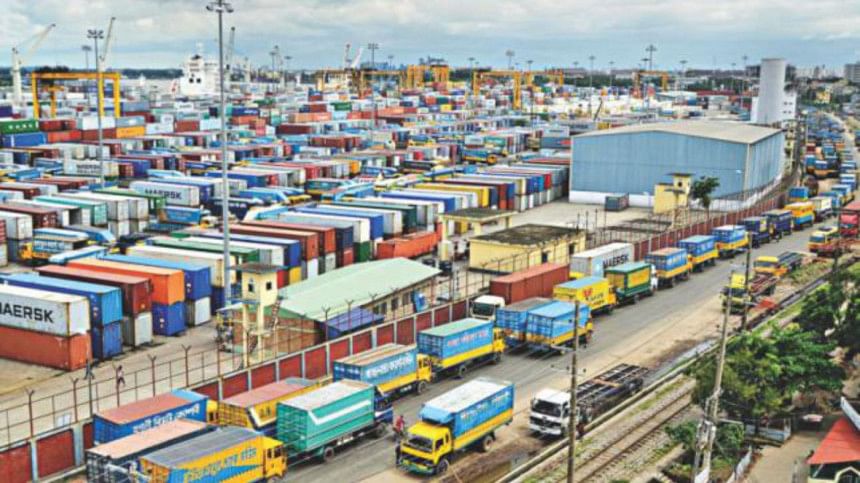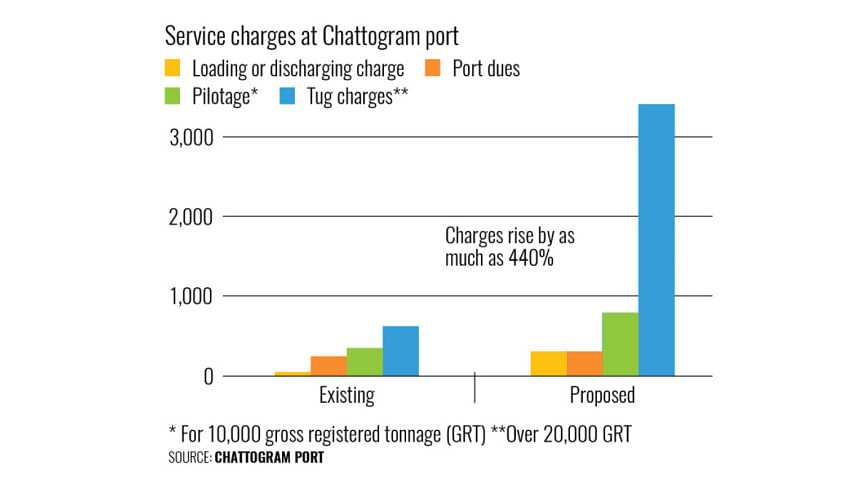Govt move to hike port charges sparks concern

After almost 40 years, Chittagong Port Authority (CPA) is set to substantially hike tariffs on a number of its goods, container, and vessel handling services.
This will likely have a detrimental effect on the country's exports, alongside prices of imported products in domestic markets.
The finance ministry has already approved the relevant proposal sent by the shipping ministry on July 24. The proposal is now awaiting the law ministry's approval before being published as a gazette.
This is the first time that the CPA is going for a major revision of its tariffs since 1986.
In fiscal year 2007-08, the CPA increased the tariffs of five major services, including tug charges, water supply charges, wharf rent, container storage charges, and container stuffing and unstuffing charges.
The CPA currently imposes tariffs or charges on over 150 services, which can be listed under 52 major categories, when they are availed by vessel owners or operators, container-operating foreign shipping lines, as well as importers.
A senior official in the CPA's finance and accounts department said that of the 52, the proposal dropped 5 as those were no longer offered and revised the rest into 23 categories.
As per the proposal originally sent by the CPA, tariffs of some of the widely availed services are set to increase by as much as 440 percent.
In some other cases, the new tariff is around 1,000 times higher than the current one.
Officials of the CPA, however, claimed that the average tariff hike would be around 60 percent.
Opposing the move, port users said they had earlier urged the CPA to keep the tariff hike limited to within 10 to 20 percent, reasoning that the country's foreign trade would otherwise be severely affected.
For the arrival of a vessel within the port's territory, the CPA currently charges $0.241 per gross registered tonnage (GRT), which is a measure of the total internal volume of a ship, specifically the enclosed spaces within the hull and above the deck.
In the proposal, this is to be increased to $0.306, a hike of nearly 27 percent.
Loading and unloading of export and import containers from vessels are the most common operations in this port.

The tariff for this service for a 20-foot full container load (FCL) container, meaning one fully occupied by a single shipper's goods, has been proposed to be hiked from $43.40 to $68, meaning an increase of 56.68 percent.
Most of the imported cargoes are unstuffed, or taken out from the containers at the port yards, to be delivered to consignees. The unstuffing charge will rise from $2.73 to $6.41, meaning a hike of 135 percent.
The CPA provides tugboat assistance during vessel movement from the outer anchorage to berthing at port jetties.
For vessels exceeding 20,000 GRT, this tug charge has been proposed to be increased from $632 to $3,415—in other words, a 440 percent hike.
The tariff for hiring mechanical equipment, such as forklifts, has been proposed to be raised from $0.86 to $10.16—a steep 1,081 percent jump.
During a visit to the port on Friday, Shipping Adviser Brig Gen (retd) M Sakhawat Hussain said the tariffs have been revised following discussions with stakeholders and inter-ministerial meetings.
He said that after analysing the tariff structures of other major global ports, it was found that even after the revision, the tariffs at the Chattogram port would still remain lower than those of the Mongla port.
CPA Chairman SM Moniruzzaman said they had never gone for a major tariff hike since 1986 and the average hike would be around 60 percent.
The CPA had twice, in 1996 and 2012, initiated the process for revising the tariff structure but failed to bring about any change.
CPA officials said the revision was long overdue, as the CPA's operational costs have risen by around 7,000 percent.
In 2020, the CPA engaged Spain-based consulting firm IDOM to analyse and propose an upgraded tariff structure.
The firm did submit the proposal in 2022, but there had been little progress since then.
The CPA board approved the proposal last December and sent it to the shipping ministry in February this year. In a discussion with stakeholders on June 2, the ministry sought their proposals.
Bangladesh Shipping Agents Association (BSAA) Chairman Syed M Arif said they had proposed limiting the tariff hike to within 10 to 15 percent so that foreign trade could continue running.
A second meeting with stakeholders was scheduled to be held once all the proposals were received, but now the tariff hike is already set to take effect, said the frustrated BSAA leader.
BSAA Director Muntasir Rubayat said the tariffs were being raised exorbitantly, and it would compel foreign vessel owners and container operators to increase freight charges, which would raise export and import costs.
Abul Bashar Chowdhury, chairman of leading commodity importing firm BSM Group, said the importers frequently face long delays in getting delivery of imports from the port.
It is mainly because vessels arriving at the Chattogram port very often have to wait for days to get berths, and loading and unloading take a long time compared to ports in neighbouring countries, he said.
Importers bear higher freight costs for such delays here, he added.
Even after containers are unloaded from vessels, the delivery faces long delays due to various complications, such as documentation and inspection, Bashar informed.
A tariff hike without an improvement in services will hurt importers, and eventually, the costs would have to be borne by end consumers, he said.
M Masrur Reaz, chairman and CEO of Policy Exchange Bangladesh, said there was no doubt that any such tariff hike would put additional pressure on businesses.
The country's imports and exports are facing several challenges—both locally and globally—including the latest uncertainty surrounding a US tariff hike, he said.
He, however, opined that a logical revision of the tariffs was overdue, as it was very important to ensure better services and improved efficiency.
Modern equipment also needs to be installed; otherwise, a lack of efficiency would cause delays, service unpredictability, and a requirement for additional documents.
Reaz suggested raising the tariffs in phases over the next six months or a year, instead of by a substantial margin in one go, so that it can be better absorbed by businesses.
Bangladesh Garment Manufacturers and Exporters Association Director Sakeef Ahmed Salam said Bangladesh's ready-made garment (RMG) industry has been struggling with several setbacks since the post-Covid-19 period.
These include the increase in global energy prices caused by the Russia-Ukraine war, rising freight rates due to conflicts in the Middle East, a global economic downturn, and the recent US tariff hike, he said.
If port tariffs are raised exorbitantly amidst these conditions, it will put immense pressure on the export-oriented manufacturing sector, Salam added.

 For all latest news, follow The Daily Star's Google News channel.
For all latest news, follow The Daily Star's Google News channel. 





Comments